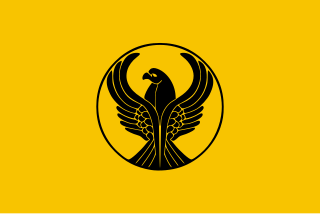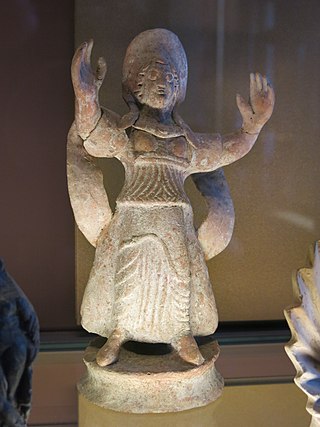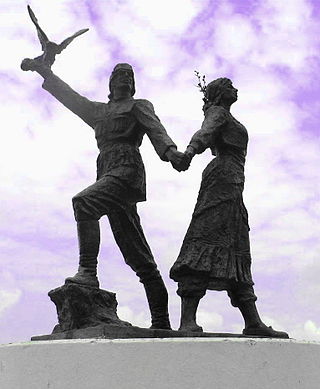
Pontus or Pontos is a region on the southern coast of the Black Sea, located in the modern-day eastern Black Sea Region of Turkey. The name was applied to the coastal region and its mountainous hinterland by the Greeks who colonized the area in the Archaic period and derived from the Greek name of the Black Sea: Εύξεινος Πόντος (Eúxinos Póntos), "Hospitable Sea", or simply Pontos as early as the Aeschylean Persians and Herodotus' Histories.

The Bosporan Kingdom, also known as the Kingdom of the Cimmerian Bosporus, was an ancient Greco-Scythian state located in eastern Crimea and the Taman Peninsula on the shores of the Cimmerian Bosporus, centered in the present-day Strait of Kerch. It was the first truly 'Hellenistic' state, in the sense that a mixed population adopted the Greek language and civilization, under aristocratic consolidated leadership. Under the Spartocid dynasty, the aristocracy of the kingdom adopted a double nature of presenting themselves as archons to Greek subjects and as kings to barbarians, which some historians consider unique in ancient history.The Bosporan Kingdom became the longest surviving Roman client kingdom. The 1st and 2nd centuries AD saw a period of a new golden age of the Bosporan state. It was briefly incorporated as part of the Roman province of Moesia Inferior from 63 to 68 AD under Emperor Nero, before being restored as a Roman client kingdom. At the end of the 2nd century AD, King Sauromates II inflicted a critical defeat on the Scythians and included all the territories of the Crimean Peninsula in the structure of his state.
Pontic Greek is a variety of Modern Greek indigenous to the Pontus region on the southern shores of the Black Sea, northeastern Anatolia, and the Eastern Turkish/Caucasus region. Today it is spoken mainly in northern Greece. Its speakers are referred to as Pontic Greeks or Pontian Greeks.

The Pontic Greeks, also Pontian Greeks or simply Pontians, are an ethnically Greek group indigenous to the region of Pontus, in northeastern Anatolia. Many later migrated to other parts of Eastern Anatolia, to the former Russian province of Kars Oblast in the Transcaucasus, and to Georgia in various waves between the Ottoman conquest of the Empire of Trebizond in 1461 and the Russo-Turkish War of 1828–1829. Those from southern Russia, Ukraine, and Crimea are often referred to as "Northern Pontic [Greeks]", in contrast to those from "South Pontus", which strictly speaking is Pontus proper. Those from Georgia, northeastern Anatolia, and the former Russian Caucasus are in contemporary Greek academic circles often referred to as "Eastern Pontic [Greeks]" or as Caucasian Greeks, but also include the Turkic-speaking Urums.
Pontic, from the Greek pontos, or "sea", may refer to:

Mithridates or Mithradates V Euergetes was a prince and the seventh king of the wealthy Kingdom of Pontus.

Fatsa is a town and a district of Ordu Province in the central Black Sea region of Turkey. Population from Fatsa is more than 115,000.

The Laz people, or Lazi, are an indigenous ethnic group who mainly live in Black Sea coastal regions of Turkey and Georgia. They traditionally speak the Laz language which is a member of the Kartvelian language family but has experienced a rapid language shift to Turkish. From the 103,900 ethnic Laz in Turkey, only around 20,000 speak Laz and the language is classified as threatened (6b) in Turkey and shifting (7) in Georgia on the Expanded Graded Intergenerational Disruption Scale.

The Republic of Pontus was a proposed Pontic Greek state on the southern coast of the Black Sea. Its territory would have encompassed much of historical Pontus and today forms part of Turkey's Black Sea Region. The proposed state was discussed at the Paris Peace Conference of 1919, but the Greek government of Eleftherios Venizelos feared the precarious position of such a state and so it was included instead in the larger proposed state of Wilsonian Armenia. Ultimately, however, neither state came into existence and the Pontic Greek population was expelled from Turkey after 1922 and resettled in the Soviet Union or in Greek Macedonia. This state of affairs was later formally recognized as part of the population exchange between Greece and Turkey in 1923. In modern Greek political circles, the exchange is seen as inextricable from the contemporaneous Greek genocide.

Pontus was a Hellenistic kingdom centered in the historical region of Pontus and ruled by the Mithridatic dynasty, which possibly may have been directly related to Darius the Great of the Achaemenid dynasty. The kingdom was proclaimed by Mithridates I in 281 BC and lasted until its conquest by the Roman Republic in 63 BC. The Kingdom of Pontus reached its largest extent under Mithridates VI the Great, who conquered Colchis, Cappadocia, Bithynia, the Greek colonies of the Tauric Chersonesos, and for a brief time the Roman province of Asia. After a long struggle with Rome in the Mithridatic Wars, Pontus was defeated. The western part of it was incorporated into the Roman Republic as the province Bithynia et Pontus; the eastern half survived as a client kingdom until 62 AD.

Ukrainian Greeks are a Greek minority that reside in or used to reside in the territory of modern Ukraine. The majority of Ukrainian Greeks live in Donetsk Oblast and are particularly concentrated around the city of Mariupol.
Serra is a Pontic Greek war dance of ancient Greek origin, from the Pontus region of the Black Sea. Its name comes from the Serra river, in the region of Trapezounda. It is also called Pyrrhichios. The rhythm starts in 7
16 and becomes an even meter when the dance speeds up.
Greeks have been present in what is now southern Russia from the 6th century BC; those settlers assimilated into the indigenous populations. The vast majority of contemporary Russia's Greek minority populations are descendants of Medieval Greek refugees, traders, and immigrants from the Byzantine Empire, the Ottoman Balkans, and Pontic Greeks from the Empire of Trebizond and Eastern Anatolia who settled mainly in southern Russia and the South Caucasus in several waves between the mid-15th century and the second Russo-Turkish War of 1828–29.
Lycomedes of Comana was a Bithynian nobleman of Cappadocian Greek descent who ruled Comana, Cappadocia in the second half of the 1st century BC.
Arsaces of Pontus was a prince from the Kingdom of Pontus. He was a monarch of Iranian and Greek Macedonian ancestry.
The Anatolian Greeks, also known as Asiatic Greeks or Asia Minor Greeks, make up the ethnic Greek populations who lived in Anatolia from 1200s BCE as a result of Greek colonization until the forceful population exchange between Greece and Turkey in 1923, though some communities in Anatolia survive to the present day.
The Kemençe of the Black Sea is a Greek and Turkish traditional musical instrument. It belongs to the category of stringed bowed musical instruments. It has three strings, usually tuned to perfect fourths, usually tuned B-E-A. It is the pre-eminent musical folk instrument of the Greeks of Pontus. It seems to have been invented during the Byzantine years, between the 11th and 12th Centuries. The instrument is made of different types of wood.
As part of the persecution of the Greek population in the Ottoman Empire, many of the people living there had to leave their homes and move abroad or to Greece. This affected in particular the Greeks from Asia Minor and the Pontos Greeks living in the Black Sea region. Many refugees found a new home in Macedonia, and some of them reached Pieria. There they represent a large part of nowadays population. Occasionally they bought lands and founded purely Pontic villages.

The Pontic eagle is the primary ethnic symbol of the Pontic Greeks, also called Pontian Greeks. The bird has spread wings and looks to the side. The eagle appears on proposed Pontic Greek ethnic flags, and many Pontic organizations use it as part of their logo.









